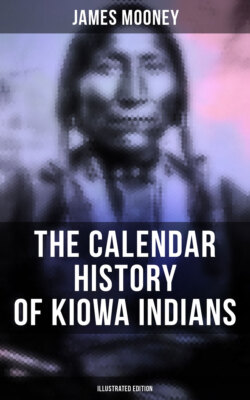Читать книгу The Calendar History of Kiowa Indians (Illustrated Edition) - James Mooney - Страница 26
На сайте Литреса книга снята с продажи.
Acquirement of Horses
ОглавлениеTable of Contents
Although the Kiowa had no horses until they came down from the mountains and settled near the Crows, it is probable that they obtained some very soon afterward, probably from their friends the Crows. La Salle, in 1682, states that the Gattacka (Kiowa Apache) and Manrhoat (Kiowa?) had then plenty of horses, which he says they had probably stolen from New Mexico (Margry, 1).
The notice in Villaseñor would indicate that they were able to mount some of their warriors as early as 1748, as it is hardly probable that they would have been able to attract attention by their inroads so far south as the Spanish settlements if their warriors had been obliged to travel entirely on foot. With some tribes, however, notably the Pawnee, it was a frequent practice for the warriors to go out on foot, returning, if successful, mounted on the horses taken from their enemies. Horses must also have been taken by the Kiowa from the Comanche, who lived south of them in the territory adjoining the Spanish possessions, and with whom the Kiowa were then at war. In the beginning of the present century we find the Kiowa mentioned as possessing large herds of horses, which they traded with the Arikara and Mandan for European goods.
Horace Jones, interpreter at Fort Sill, states that at a council held at Fort Cobb in 1868, Ten-bears, an old Comanche chief, scorned the Kiowa for their constant raids into Mexico and Texas in spite of their promises to the government to cease such practices, saying to the assembled Kiowa, "When we first knew you, you had nothing but dogs and sleds. Now you have plenty of horses, and where did you get them if they were not stolen from Mexico?" This must be interpreted, however, from a point of comparison of the Comanche, who have long been noted for the number of their ponies. It was certainly a case of the pot calling the kettle black, as the principal business of both tribes for generations, until confined to a reservation, was that of raiding their southern neighbors in order to obtain horses and captives. It is unnecessary to dilate on the revolution made in the life of the Indian by the possession of the horse. Without it he was a half-starved skulker in the timber, creeping up on foot toward the unwary deer or building a brush corral with infinite labor to surround a herd of antelope, and seldom venturing more than a few days' journey from home. With the horse he was transformed into the daring buffalo hunter, able to procure in a single day enough food to supply his family for a year, leaving him free then to sweep the plains with his war parties along a range of a thousand miles.
